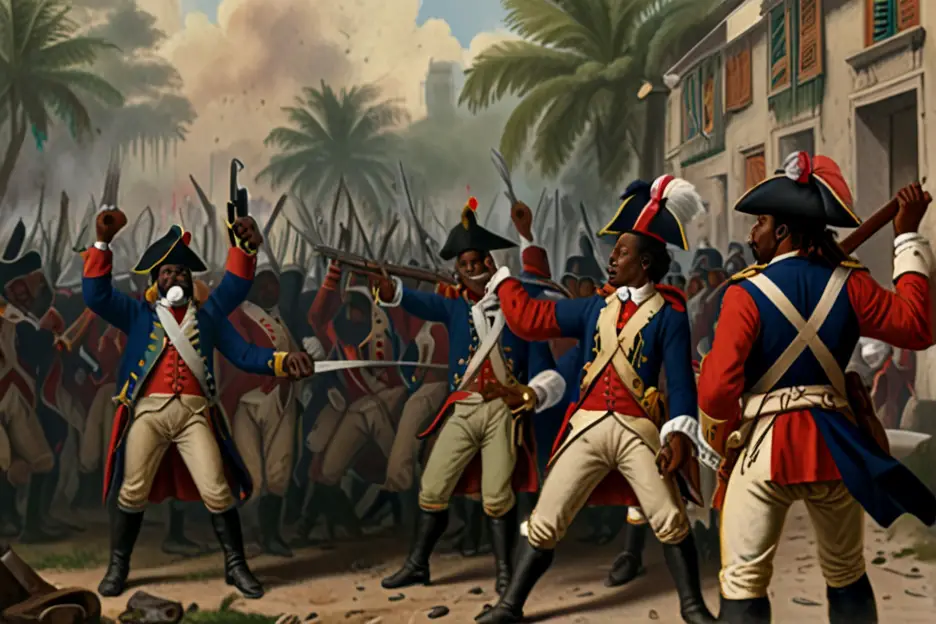
The French and Haitian Revolutions are two significant events in world history that share some similarities but also have distinct differences.
Both revolutions were driven by the desire for freedom, equality, and democracy, but they were shaped by different historical contexts and had different outcomes.
In this article, we will explore the causes, key events, and outcomes of both revolutions, as well as their similarities and differences.
Causes of Revolution
French Revolution
Economic turmoil
The French Revolution was precipitated by a financial crisis within the monarchy, characterized by extravagant spending, unfair taxation, and mounting national debt.
This economic turmoil strained the economy and imposed heavy tax burdens on the common people, particularly the lower classes.
Social inequality
The widening gap between the wealthy elite and the impoverished masses fueled social discontent and resentment.
The lower classes bore the brunt of economic hardship while the aristocracy enjoyed privileges and wealth, exacerbating tensions within French society.
- Read also: Liberty vs Equality: The French Revolution vs American Revolution
- Read also: The Rise and Fall of the Jacobins in the French Revolution
Failure of monarchy
The monarchy’s inability to address the economic crisis and enact meaningful reforms contributed to growing disillusionment and anger among the French populace.
The monarchy’s perceived indifference to the plight of the people further eroded public trust and confidence in the government.
Enlightenment ideals
The spread of Enlightenment ideas, emphasizing principles of liberty, equality, and fraternity, played a pivotal role in shaping revolutionary sentiment.
Intellectuals and ordinary citizens alike were inspired by Enlightenment philosophy, which challenged traditional social hierarchies and advocated for political participation and social justice.
Political consciousness
The dissemination of Enlightenment ideals sparked a burgeoning political consciousness among the French people, prompting them to question the legitimacy of existing power structures and demand greater accountability from their rulers.
This growing awareness laid the groundwork for revolutionary fervor and collective action.
Haitian Revolution
Brutal oppression and exploitation
The Haitian Revolution was sparked by centuries of brutal oppression and exploitation endured by enslaved people in Saint-Domingue.
Forced to work on lucrative sugar plantations under harsh conditions, they faced inhumane treatment, violence, and degradation at the hands of their French masters.
Injustice of slavery
The inherent injustice and cruelty of slavery fueled deep-seated grievances among the enslaved population.
Their yearning for freedom and dignity was a direct response to the dehumanizing nature of their enslavement and the denial of their fundamental rights.
Enlightenment ideals
Enlightenment ideals of liberty, equality, and human rights permeated the enslaved community, challenging the legitimacy of their enslavement.
Inspired by Enlightenment philosophy, they began to question the hierarchical social order and assert their inherent right to freedom and self-determination.
Influence of revolutionary movements
The success of revolutionary movements elsewhere, notably the French Revolution, served as a catalyst for change in Saint-Domingue.
Enslaved individuals were emboldened by the revolutionary fervor sweeping across Europe and the Americas, leading them to seize upon the opportunity to rise up against their oppressors.
Desire for self-determination
Influenced by Enlightenment ideals and inspired by the achievements of other revolutionary movements, enslaved individuals in Saint-Domingue yearned to assert their right to self-determination.
They sought to break free from the shackles of slavery and establish a society based on principles of liberty, equality, and justice.

Key Events and Leaders
French revolution
Events
The French Revolution, a pivotal period in history, was characterized by several significant events. Among these were the Storming of the Bastille, a symbol of royal tyranny, and the subsequent execution of King Louis XVI, marking the overthrow of the monarchy.
Another crucial event was the rise of Napoleon Bonaparte, who emerged as a prominent military leader and later seized power, reshaping France and much of Europe.
Leaders
Leaders of the French Revolution played instrumental roles in shaping its course.
Figures such as Maximilien Robespierre, known for his radical ideologies, and Georges Danton, a key figure in the early stages of the revolution, were influential in driving revolutionary change.
Napoleon Bonaparte, while initially celebrated for his military prowess, later assumed dictatorial control, culminating in his crowning as Emperor of France.
Haitian revolution
Events
The Haitian Revolution, a beacon of hope for enslaved peoples worldwide, was marked by several pivotal events.
These included the courageous slave rebellion led by Toussaint L’Ouverture, which challenged colonial oppression and laid the groundwork for Haiti’s independence.
The decisive Battle of Vertières, where Haitian forces defeated Napoleon’s army, was a turning point in the struggle for freedom.
Ultimately, Haiti emerged as the first independent nation in Latin America and the Caribbean.
Leaders
Leaders of the Haitian Revolution demonstrated remarkable courage and resilience in the face of adversity.
Toussaint L’Ouverture, revered as a visionary leader and military strategist, led the charge for emancipation and inspired countless others to join the fight for liberation.
Jean-Jacques Dessalines, a fierce advocate for Haitian independence, declared the nation’s sovereignty and became its first ruler.
Henri Christophe, known for his efforts to rebuild Haiti and establish a stable government, played a crucial role in shaping the nation’s early history.

Outcomes and Legacies
French revolution
The French Revolution left an indelible mark on European history, reshaping the political landscape and igniting the flames of change across the continent.
It heralded the dawn of the modern nation-state, dismantling the monarchy and paving the way for democratic principles to take root.
Moreover, the revolution sparked a fervent embrace of Enlightenment ideals, propelling the spread of reason, liberty, and equality throughout Europe.
Its legacy endures in the foundations of modern democracy and the ongoing pursuit of social justice.
Haitian revolution
The Haitian Revolution stands as a beacon of hope and resilience in the annals of history, forever altering the course of slavery and colonialism in the Western Hemisphere.
It dealt a decisive blow to the institution of slavery, culminating in the abolition of bondage in Haiti and the establishment of the first independent black republic.
By breaking the chains of colonial oppression, the revolution shattered the myth of racial superiority and inspired marginalized peoples worldwide to strive for freedom and self-determination.
Its legacy reverberates in the ongoing fight against racism, inequality, and injustice.
A Critical Comparison
Similarities
The French and Haitian Revolutions share several similarities, including:
Common enlightenment influences
Both revolutions were influenced by the Enlightenment ideas of liberty, equality, and fraternity, which emphasized the importance of individual rights and the rejection of absolute monarchy.
Social and economic unrest
Both revolutions were sparked by social and economic unrest, with the French Revolution being driven by the financial crisis of the French monarchy and the growing discontent among the French people, while the Haitian Revolution was driven by the brutal treatment of slaves and the desire for freedom and equality.
Rebellion against oppressive governments
Both revolutions involved a rebellion against oppressive governments, with the French Revolution aiming to overthrow the monarchy and establish a new government based on the principles of the Enlightenment, and the Haitian Revolution aiming to overthrow the French colonial government and establish a new government based on the principles of freedom and equality.
Use of violence
Both revolutions involved the use of violence, with the French Revolution marked by the Reign of Terror and the Haitian Revolution marked by the brutal suppression of the slave rebellion by the French colonial government.
Impact on the world
Both revolutions had significant impacts on the world, with the French Revolution contributing to the spread of Enlightenment ideas across Europe and the Haitian Revolution contributing to the abolition of slavery in Haiti and the establishment of the first independent black nation in the Western Hemisphere.

Differences
| Aspect | French Revolution |
Haitian Revolution
|
| Location | France |
Saint-Domingue (present-day Haiti)
|
| Primary Cause | Social inequality, economic hardship, political discontent |
Slave rebellion against colonial oppression, desire for freedom and independence
|
| Main Participants | French citizens, bourgeoisie, peasants, intellectuals |
Enslaved Africans, free people of color, former slaves
|
| Leadership | Maximilien Robespierre, Georges Danton, Napoleon Bonaparte |
Toussaint L’Ouverture, Jean-Jacques Dessalines, Henri Christophe
|
| Outcome | Transition from monarchy to republic, spread of Enlightenment ideas throughout Europe, rise of Napoleon Bonaparte |
Abolition of slavery in Haiti, establishment of the first independent black nation in the Western Hemisphere
|
| Impact | Establishment of modern nation-state, advancement of democratic principles, lasting impact on European politics |
Defeat of colonial powers, abolition of slavery, inspiration for anti-colonial movements worldwide, challenging racial hierarchies
|
| Legacy | Legacy of democracy, human rights, and social justice |
Legacy of liberation, resilience, and empowerment, ongoing struggle against racism and inequality
|
- Read also: Idealism vs Reality: The Rise and Fall of The Girondins
- Read also: Unveiling History: Civil War vs Revolutionary War
Conclusion
The French and Haitian Revolutions were two significant events in world history that share some similarities but also have distinct differences.
Both revolutions were driven by the desire for freedom and equality, but they were shaped by different historical contexts and had different outcomes.
The French Revolution was a primarily European event that led to the establishment of the modern nation-state and the spread of Enlightenment ideas across the continent.
The Haitian Revolution, on the other hand, was a primarily African event that led to the abolition of slavery in Haiti and the establishment of the first independent black nation in the Western Hemisphere.
FAQs
The main causes of the French Revolution were the financial crisis of the French monarchy, the growing influence of the Enlightenment ideas of liberty, equality, and fraternity, and the growing discontent among the French people.
The main causes of the Haitian Revolution were the brutal treatment of slaves by their French masters, the growing influence of the Enlightenment ideas of liberty and equality among the enslaved people, and the desire for independence and self-governance.
The key events of the French Revolution included the Storming of the Bastille, the execution of King Louis XVI, and the rise of Napoleon Bonaparte. The key leaders of the French Revolution included figures such as Maximilien Robespierre, Georges Danton, and Napoleon Bonaparte.
The key events of the Haitian Revolution included the slave rebellion led by Toussaint L’Ouverture, the Battle of Vertières, and the establishment of Haiti as an independent nation. The key leaders of the Haitian Revolution included figures such as Toussaint L’Ouverture, Jean-Jacques Dessalines, and Henri Christophe.


